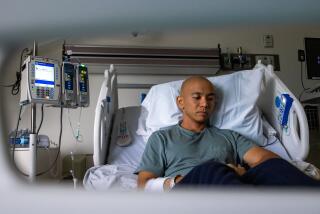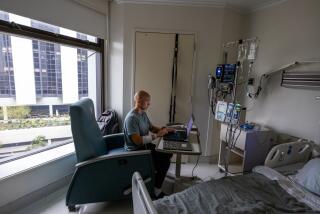The Waiting Is Taking Its Toll of Kidney Patient Who Needs Donor
- Share via
The waiting is getting to Jeff Bergan, his mother said.
“I can see the dark circles under his eyes, the total exhaustion. There are times when we all get on his nerves. He’s getting very frustrated,” said Sandy Bergan.
“The doctor from Stanford (University Medical Center in Palo Alto) said he hoped something would be done before Christmastime, because otherwise something is going to go wrong with his heart.”
Jeff Bergan, 26 years old and an assistant football and wrestling coach at Mission Viejo High School, has been waiting two years for a kidney transplant. During that time, doctors discovered that his heart also is failing.
Last April, on the chance that he might need simultaneous heart and kidney transplants, Bergan went to the Stanford hospital, the only one in the West authorized to undertake such a dual operation.
A team of about 30 physicians reviewed his case. Their consensus: Try a kidney transplant first, because that sometimes is enough to revive the ailing heart. But hurry, because Bergan’s heart is dilated, enlarged and critically weak.
No one in Bergan’s family turned out to be a suitable kidney donor. Bergan, already on the kidney transplant waiting list at St. Vincent Medical Center in Los Angeles, was referred to the UC San Francisco Medical Center, which also listed him as a high-priority case.
Now he must hope for a healthy kidney from someone approximating his genetic structure. And that, said Dr. Nicholas J. Feduska, the UCSF professor of surgery familiar with Bergan’s case, “is entirely unpredictable. Some patients have to wait forever.”
But since Bergan’s blood is the most common type, “the possibilities of identifying a donor in timely fashion are good,” Feduska said.
So Bergan waits, impatiently, his failing heart making him constantly weary and his uncertainty making him constantly frustrated.
“I sleep a lot,” he said. “I get a nap whenever I can.” But when he awakens at 6 a.m. each morning, “it feels like I just went to bed.”
He rises that early because three times a week he must spend three hours attached to a dialysis machine, which substitutes for his failed kidneys by cleansing his blood. Without it, he would die.
By noon each day, he is at Mission Viejo High School, where he was a star athlete and since 1982 has helped as a low-paid, part-time coach. Though he still appears robust, he moves among his players like a man who already has put in a hard day. “I’m very, very tired when I come in after practice at 5:15, 5:30. I’m really bushed,” he said. “I just feel tired all the time.”
He has attended several colleges, including Saddleback College in Mission Viejo and Cal State Fullerton, aiming for a teaching credential so he can coach at a high school full time. But the fatigue--and the possibility that he will be hospitalized at any moment--has kept him from continuing his college classes.
Living on a $550-a-month Social Security allotment, he rents a $300-a-month room in Lake Forest not far from his mother’s home. Some of his medical costs are covered by Medi-Cal and Medicare, and a committee of Mission Viejo High School coaches and players’ mothers has raised $50,000 for his medical bills.
Still, the cost of a combination heart and kidney transplant can reach half a million dollars. His money situation “ain’t a pretty sight,” Bergan said.
“It sounds greedy, but I want it done pronto, “ Bergan said. “It’s a little morbid; I have to wait for someone to die. But that’s what will happen. I want to get my degree so I can get on with my life. I want to support myself, get married. I want to do this (coach) full time at the high-school level and teach. I want it to happen today. But I have to take each day at a time,” he said.
“I’m on this beeper. That’s a step up,” he said. His telephone pager is constantly attached to him like a talisman. When it goes off, it is supposed to mean that a kidney has been found and he must hurry to the hospital.
So far it has sounded five or six times, always a false alarm set off either by electronic mistake or radio interference. “I jumped out of bed,” Bergan’s mother said. “I hear it, and I think, ‘Oh, God,’ but then he says, ‘I was just testing it.’ ”
He tests it frequently, she said. He always carries extra batteries.
“He gets anxious. He’s scared,” his mother said. “The strain of just waiting--every day I see him go downhill a little bit more.”
More to Read
Sign up for Essential California
The most important California stories and recommendations in your inbox every morning.
You may occasionally receive promotional content from the Los Angeles Times.










